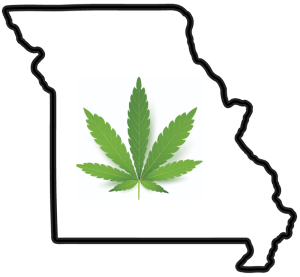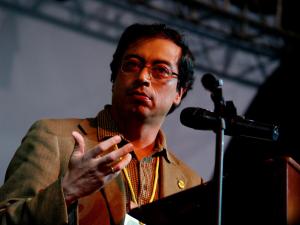North Dakota becomes the fifth state to qualify a marijuana legalization for the ballot this year.
This makes three states that will have marijuana legalization on the ballot in November, with three more still possible.
A California cop gets nailed for flushing someone's legal marijuana down a toilet, a Denver sheriff's deputy heads to the slammer for her role in a drug-dealing ring, and more.
Coca grower factions continue to clash in Bolivia, Colombia's new president will move to decriminalize drugs, and more.
A Congressional Research Service report zeroes in on the Jalisco New Generation Cartel, the Remedy Alliance is easing naloxone bottlenecks, and more.
A Florida marijuana legalization initiative campaign aimed at 2024 gets underway, a Colorado natural psychedelic initiative comes up short, and more.
An Ohio harm reduction group is suing a state board over how $400 million in opioid settlement money is spent, an Uruguayan meth bust signals a possible shift in drug trafficking between Europe and South America, and more.
Maryland officials finalize the ballot language for a marijuana legalization referendum, a Florida marijuana legalization bill dies without a hearing, and more.
Another Texas poll has solid majority support for marijuana legalization, cartel violence flares in Mexico, and more.
A South Dakota marijuana legalization initatiive draws organized opposition, Mexico's week of cartel violence raises questions, and more.
South Korean prosecutors sign on for more, better drug war, a group of French senators makes an urgent call for marijuana legalization, and more.
Nevada's Supreme Court rules against employees who smoke marijuana, Ireland is about to see its first pilot drug checking program, and more.
Wisconsin's Republican legislative majority is out of step with the people when it comes to freeing the weed, an Idaho medical marijuana initiative campaign takes a first step, and more.
A Swiss pilot program allowing legal marijuana sales will begin in three weeks, Colombia's president plans a drug decrime move, and more.
And then there were five: With an announcement Monday by the secretary of state that a New Approach North Dakota marijuana legalization initiative had qualified for the ballot, the number of states where legalization is on the ballot climbs to five. The others are Maryland, Missouri, North Dakota, and South Dakota. (Another legalization effort in Oklahoma is awaiting confirmation that it has gathered sufficient valid voter signatures to qualify for the ballot.)
New Approach North Dakota easily cleared the state's signature requirement of 15,582 valid voter signatures, with the secretary of state's office reporting the group had 23,368 valid signatures.
Now officially known as Initiated Statutory Measure No. 1, the initiative would allow people 21 and over to possess up to an ounce of marijuana, four grams of concentrates and infused products, and grow up to three plants at home, but not to consume it in public.
The measure includes specific child custody protections for parents who use marijuana in accord with state law, but employers could continue to prohibit marijuana use and there is no provision for expungement. New Approach North Dakota says it intends to address that in the legislature next year. The measure would also allow cities and counties to opt out of allowing marijuana businesses.
The initiative also creates a regulatory framework for commercial production and sales of marijuana with the Department of Health and Human Services (or a different agency designated by the legislature) developing rules and regulations and overseeing licensing of marijuana businesses. Regulators would have until October 1, 2023, to come up with rules for advertising, labeling, packaging, security, and testing standards.
There would be no new tax for marijuana, but the state's 5 percent retail sales tax would apply to marijuana sales. Those tax revenues are not designated for any particular fund. Commercial cultivators would have to pay an annual $110,000 registration fee and retailers would have to pay an annual $90,000 fee.
The number of retailers would be limited to 18 and the number of grow facilities limited to seven. In a bid to reduce monopolistic tendencies in the industry, no one person or entity could own more than one grow facility or four retail stores.
"Measure 1 is a conservative approach to cannabis legalization based on legislation passed by the North Dakota House of Representatives. It balances personal freedom with personal responsibility," said state Rep. Matthew Ruby (R), a member of the campaign's sponsoring committee. "Adults will no longer be punished for using cannabis -- but only if they do so safely and responsibly. As voters have a chance to review the measure in detail, I'm confident a majority will agree this is the right approach for North Dakota."
Just four years ago, state voters rejected a marijuana legalization initiative by a margin of 59 percent to 41 percent, but things will be different this time around, argued New Approach North Dakota campaign chairman David Owen.
"So, the biggest difference between now and Measure 3 of 2018… is this is restricted, regulated, controlled, legal marijuana," Owen said.
"I served as a police officer in Bismarck for over five years and have defended those accused of marijuana offenses for the last twenty years, said Mark Friese, an attorney and former police officer who is the campaign treasurer. "There is no public safety benefit from arresting adults for small amounts of marijuana. It is a waste of taxpayer resources and a distraction from serious public safety concerns. Cannabis causes far less harm than alcohol. Many people find therapeutic benefits from it. The government shouldn't be in the business of punishing adults who use cannabis responsibly."
Up to now, 19 states and the District of Columbia have legalized marijuana, and in 11 of them and DC, it was via the initiative process. We are likely to pick up several more in November. In the best-case scenario, when the dust settles after Election Day, half the states in the country will have legalized it.
back to top
Missourians will be voting on whether to free the weed in November. On Tuesday, Secretary of State John Ashcroft certified that an initiative in the form of a constitutional amendment to legalize marijuana had turned enough valid voter signatures in to qualify for the ballot.

Missouri.png
That means voters in a trio of states will have their say on marijuana legalization in November. Similar initiatives in Maryland and South Dakota have already been approved. And there could be more: Signatures for initiatives have already been turned in and are awaiting verification in North Dakota and Oklahoma, and Arkansas activists qualified for the ballot, too, only to see their efforts thrown out over the ballot title. They are appealing that decision.
"I encourage Missourians to study and educate themselves on any ballot initiative," Ashcroft said in a press release. "Initiative 2022-059 that voters will see on the November ballot is particularly lengthy and should be given careful consideration."
According to Legalize Missouri 2022, the group behind the initiative, it would allow "Missourians 21 years and older to possess, purchase, consume and cultivate marijuana," as well as providing for the automatic expungement of nonviolent marijuana-related offenses. People would be able to possess up to three ounces and grow up to six flowering plants, along with six immature plants, and six clones.
The initiative would tax retail sales at 6 percent, with localities allowed to add a 3 percent sales tax. It also gives cities and counties the option of disallowing retail sales via a popular vote.
The measure also "seeks to broaden industry participation by small business owners and among disadvantaged populations, including those with limited capital, residents of high-poverty communities, service-disabled veterans, and those previously convicted of nonviolent marijuana offenses." It would also allow existing medical marijuana operations to seek recreational sales licenses beginning December 8, with regulators allowed up to 60 days to approve them, giving them an effective head-start on newcomer competitors.
"Our statewide coalition of activists, business owners, medical marijuana patients and criminal justice reform advocates has worked tirelessly to reach this point, and deserves all the credit," said John Payne, Legal Missouri 2022 campaign manager said in a press release on Tuesday. "Our campaign volunteers collected 100,000 signatures, on top of paid signature collection. That outpouring of grassroots support among Missourians who want to legalize, tax and regulate cannabis made all the difference."
The National Organization for the Reform of Marijuana Laws (NORML) and its state chapter supported the initiative and were part of that coalition.
"NORML's Chapter leaders in Missouri played a major role in writing this initiative so that cannabis consumers' interests are protected," Missouri NORML Coordinator and Legal MO '22 Advisory Board Chair Dan Viets said.
And national NORML was optimistic about November.
"Recent polling reveals that a majority of Missouri residents are ready and eager to end their state's failed marijuana prohibition," NORML Executive Director Erik Altieri said. "That is because Missourians, like the overwhelming majority of all Americans, recognize that prohibition is a disastrous and draconian practice best cast into the waste bin of history. Voters in the Show Me State want a sensible policy of legalization and regulation, and that is why we expect that they will overwhelmingly vote 'yes' on this initiative this fall."
But not everybody in the Missouri marijuana community is happy. The pro-legalization and criminal justice reform group Great State Strategies, led by lobbyist Eapen Thampy, has come out against the measure because it includes some criminal penalties, such as for smoking in a public place, and because of complaints over licensing.
"We oppose this initiative because it would create constitutional criminal penalties for marijuana possession and use and furthermore excludes those with felony marijuana charges from automatic expungement or release from prison," Thampy said in a statement. "Their licensing scheme is racist and offensive: instead of opening up the free market they create a second class, Jim Crow licensing structure that will be easily rigged by the major industry players."
Similarly, the Missouri Marijuana Legalization Movement said it planned to campaign against the initiative, also citing the criminal penalties, as well as fears that giving the existing medical marijuana industry the first crack at recreational licenses would give it too much control over adult-use marijuana.
"Here we are still putting people in jail over dime bags while these rich men are making millions of dollars under these dispensaries and grow facilities," group founder Tim Gilio said.
Whether the concerns of the disgruntled activists will resonate with the voters remain to be seen, but now, the Show Me state has the chance to show the rest of the country where it stands.
back to top
A California cop gets nailed for flushing legal weed down a toilet, a Denver sheriff's deputy heads to the slammer for her role in a drug-dealing ring, and more. Let's get to it:
In Bakersfield, California,
a senior Bakersfield police officer was arrested last Thursday for -- get this! -- flushing legal marijuana down a toilet. Officer Brendan Thebeau was part of a team of officers who served a search warrant on a residence, where the suspect brandished a weapon at officers and was arrested. When other officers were not looking, Thebeau flushed the pot down the toilet. He went down after a citizen complained and a review of his body camera footage showed him doing so. He is charged with petty theft and is now on administrative leave pending further investigation.
In Anchorage, Alaska, a former Mat-Su prison guard was sentenced last Wednesday to two years in prison for smuggling drugs and cellphones into the Goose Creek Correctional Center. Angela Lincoln pleaded guilty to smuggling suboxone and cellphones to an inmate serving a 100-year sentence and admitted that she allowed "greed to overcome her ethical responsibilities." She also admitted pocketing $30,000 in bribes for her efforts.
In Denver, Colorado, a former Denver County sheriff's deputy was sentenced last Friday to 51 months in federal prison for her role in a drug-selling scheme. Syvlia Montoya, 49, went down after being caught with drugs and cash during a traffic stop. But first, her co-defendant was caught with a stolen, loaded handgun, 8 grams of meth, and 1.6 grams of cocaine during a traffic stop while driving her vehicle. In the second traffic stop weeks later, Montoya and her co-defendant were caught with $3,000 in cash and a plastic bag with a powdery white residue. After that, police searched her apartment and found 102 grams of cocaine, 8 grams of heroin, 27 grams of meth, four digital scales, and $1,342 in cash. Montoya had earlier pleaded guilty to maintaining a residence for the purpose of distributing illegal narcotics.
back to top
Coca grower factions continue to clash in Bolivia, Colombia's new president will move to decriminalize drugs, and more.

A coca lab in Honduras (HSDN)
Arkansas Marijuana Legalization Campaign Sues to Get Initiative Back on the Ballot. Responsible Growth Arkansas, the group behind a marijuana legalization initiative, has filed suit against the State Board of Election Commissioners after the board earlier this week declined to certify the measure for the November ballot even though it had surpassed the required number of valid voter signatures. The board contended that the ballot title and description did not adequately describe the initiative, but Responsible Growth Arkansas says the board made an "incorrect" decision and "denied the wishes of hundreds of thousands of Arkansans to have the opportunity to vote on the Amendment."
International
Bolivia Coca Conflict Continues. Competing coca grower union factions, one affiliated with the government of President Luis Arce and the other opposed, continued to clash in La Paz this week. Adepcoca, which is the nation's largest coca union, is divided, with one faction now calling for the resignation of Minister of Rural Development Remmy Gonzales. And they are demanding the closure of a "parallel market" administered by coca union leader Arnold Alanez, whom the government recognizes as the leader of Adepcoca, and have filed a lawsuit against the government to force its closure. There are only two recognized coca markets, the Adepcoca market in La Paz and the Sacaba market in Cochabamba, and the Adepcoca growers say the third market is "illegal."
Colombia's Incoming Government Will Move to Decriminalize Drugs. The incoming administration of leftist President-elect Gustavo Petro is preparing drug policy proposals including drug decriminalization as it faces record cocaine production and violence from illegal armed groups and traffickers involved in the trade. Petro takes office on Sunday. His drug policy coordinator, Felipe Tascon, said that Petro also wants to end forced eradication of coca crops and instead concentrate on developing the rural economy. Tascon added that Petro will "speak up louder internationally" to explain that the problem is not drugs but "the problems drug prohibition created" and that "Bolivia, Peru, Chile, Colombia, Mexico, and Brazil, if Lula wins, as progressive countries affected by narcotics can propose it as a block."
Honduras Sends in Military to Stop Illegal Coca Production. Honduran soldiers this week were on a mission to destroy a 75-acre coca field in the rugged mountains of Colon department. It's part of an effort by leftist President Xiomara Castro to prevent the country from becoming a cocaine producer. "In the operation, we are carrying out [they have seized] around 42 manzanas of coca bushes, with an approximate yield of one million 600 plants," the military said. There were also "eight nurseries with 50,000 plants ready for transplanting, six drug laboratories" and "three blocks of marijuana." More than 2.6 million coca plants have been seized this year, the military said. "We already have problems with being a transit and consumer country, but being a producer country would generate a criminality that we could not possibly control," it added.
back to top
A Congressional Research Service report zeroes in on the Jalisco New Generation Cartel, the Remedy Alliance is easing naloxone bottlenecks, and more.

Colombian President Gustavo Petro (Creative Commons)
Naloxone Access About to Get Easier. Thanks to an informal buyers' club for naloxone that has morphed into an entity known as the Remedy Alliance, access to inexpensive naloxone -- the opioid overdose reversal drug -- is getting easier. The Alliance credits two major developments for the urgently needed breakthrough. First, they have managed to reach agreements with drug manufacturers to get the drug at a discount rate, and second, they have restructured to a system that allows local harm reduction groups to order the drug through an online store, getting around a labyrinthine web of federal regulations that has bottlenecked the flow of the drug amidst the ongoing overdose crisis.
"We think this will totally change the landscape of naloxone in the United States," said Nabarun Dasgupta, the nonprofit's board president and a scientist at the Gillings School of Global Public Health at the University of North Carolina at Chapel Hill. The group, formerly known as the Opioid Safety and Naloxone Network Buyers Club, has already reversed thousands of opioid overdoses and distributed 1.3 million doses of naloxone last year. Now, the Alliance expects to distribute 2 million doses this year.
International
Ex-Leftist Rebel, Drug War Critic Assumes Office as Colombia's President. Gustavo Petro, a former member of the leftist M-19 guerrilla army, was sworn into office Sunday, helping to cement an emerging leftist bloc around the region, consisting of Bolivia, Chile, Mexico, Peru, Venezuela and, most likely, Brazil after its October election. He said Colombia was getting a "second chance" to fight violence and poverty. He also said he was preparing to start peace talks with various armed groups around the country, and he called on the United States to change its prohibitionist approach to drug policy. "It's time for a new international convention that accepts that the war on drugs has failed," he said. "Of course, peace is possible. But it depends on current drug policies being substituted with strong measures that prevent consumption in developed societies."
Jalisco New Generation Cartel Present in 27 of Mexico's 37 States, Congressional Report Finds. The Jalisco New Generation Cartel (CJNG), the country's most powerful, now operates in 27 states and Mexico City, according to a new report from the Congressional Research Service (CRS). The report, "Mexico: Organized Crime and Drug Trafficking Organizations," says that the CJNG is the dominant criminal force in six states: Jalisco, Nayarit, Colima, Guerrero, Mexico, and Veracruz. It is weakest in Mexico's northwest, where the Sinaloa Cartel still dominates. CRS described the CJNG as an "extremely powerful cartel" that has a "reputations for extreme and intimidating violence." It also noted that the DEA "considers the CJNG a top US threat and Mexico's best-armed criminal group."
"The CJNG built its dominance internationally first through extending its presence through a rapid expansion inside Mexico," CRS said. "In 2016, many analysts maintained the CJNG controlled a territory equivalent to almost half of Mexico. The group has battled Los Zetas and Gulf Cartel factions in Tabasco, Veracruz, and Guanajuato, as well as the Sinaloa… [Cartel] in the Baja Peninsula and Chihuahua." The CJNG's ambitious expansion campaign was characterized by high levels of violence, particularly in Ciudad Juárez and Tijuana.
By taking over key ports on both the Atlantic and Pacific coasts, the CJNG has consolidated "important components of the global narcotics supply chain," the CRS said. "In particular, the CJNG maintains reported control over the ports of Veracruz, Manzanillo, and Lázaro Cárdenas, which has given the group access to precursor chemicals that flow into Mexico from China and other parts of Latin America," the report said. As a result, according to some analysts, the CJNG has pursued an aggressive growth strategy underwritten by US demand for Mexican methamphetamine, heroin, and fentanyl… Despite leadership losses, the CJNG has extended its geographic reach and maintained its own cohesion while exploiting the infighting among factions of the Sinaloa organization."
back to top
A Florida marijuana legalization initiative campaign aimed at 2024 gets underway, a Colorado natural psychedelic initiative comes up short, and more.

Marijuana testing is contributing to the truck driver shortage. (Creative Commons)
. Amid chronic shortages of long-haul truck drivers, federal data from the Department of Transportation (DOT) shows that more than 10,000 truck drivers have been ordered off the road after testing positive for marijuana just between January 1 and April 1 of this year. That is a 33 percent increase over the same period in 2021. DOT's Federal Motor Carrier Safety Administration has also doubled the frequency of drug testing of truck drivers. Under federal law, CDL licensed drivers are not permitted to consume cannabis under any circumstances, regardless of whether marijuana use is legal where they live. Currently, more than 89,000 commercially licensed truck drivers are barred from the road because of positive drug tests; more than half of them are for people testing positive for marijuana.
Florida 2024 Marijuana Legalization Initiative Campaign Launched. A group calling itself Smart & Safe Florida filed a marijuana legalization initiative aimed at the 2024 ballot Monday. The campaign is initially being bankrolled by Trulieve, the state's largest medical marijuana provider. The measure would legalize the possession of up to an ounce by people 21 and over and allow existing medical marijuana retailers to sell to the recreational market, which would benefit Trulieve. It includes a provision that allows for -- but does not require -- the state to issue additional retail licenses. It does not include provisions for expungement, social equity, or home cultivation. The campaign will need to come up with roughly 900,000 valid voter signatures to qualify for the 2024 ballot. Previous initiative campaigns have been rejected by the state Supreme Court, but Smart & Safe Florida says its bare-bones initiative should be able to avoid or overcome legal challenges.
Missouri Marijuana Legalization Initiative Qualifies for November Ballot. A marijuana legalization initiative sponsored by Legal Missouri 2022 has qualified for the November ballot, Secretary of State Jay Ashcroft announced Tuesday. The initiative takes the form of a constitutional amendment that would remove bans on the possession, manufacturing, and sales of marijuana from the state constitution for people 21 and over. Building on an earlier medical marijuana constitutional amendment, the measure would also increase the number of retail sales licenses. It also includes a provision for the expungement of records.
Medical Marijuana
Biden DOJ Says Medical Marijuana Patients Too "Dangerous" to Own Guns. The Justice Department on Monday sought to persuade a federal court to overturn a policy blocking medical marijuana patients from buying or owning guns. The department was responding to a lawsuit filed by Florida Agriculture Commissioner Nikki Fried and several medical marijuana users that argues that the policy deprives patients of their 2nd Amendment rights. The Justice Department told the court that it would be too "dangerous to trust regular marijuana users to exercise sound judgment" around guns. The department also argued that gun rights are reserved for "law-abiding" people, noting that marijuana remains illegal under federal law. "This memorandum uses the phrase 'medical marijuana' for convenience, but Congress has found that marijuana 'has no currently accepted medical use.'"
Psychedelics
Colorado Natural Psychedelic Decriminalization Initiative Falls Short on Signatures. Campaigners for Initiative 61, "Legal Possession and Use of Entheogenic Plants and Fungi," announced Monday that the measure would not qualify for the ballot. Monday was the last day to turn in signatures, and organizers said their all-volunteer signature-gathering campaign had come up short. Another psychedelic reform measure, Initiative 58, the "Natural Medicine Health Care Act," has already qualified for the November ballot. It would decriminalize the possession of psilocybin and allow for its use in state-regulated settings.
back to top
An Ohio harm reduction group is suing a state board over how $400 million in opioid settlement money is spent, an Uruguayan meth bust signals a possible shift in drug trafficking between Europe and South America, and more.

Joe Biden and new Colombian President Petro are not on the same page when it comes to drug policy. (Creative Commons)
Colorado Marijuana Sales Decline for Fourth Straight Month. For the fourth month in a row, marijuana sales in Colorado have declined. Sales in June were just $146 million, a 1% decline from the previous month, but a 22% decline from June 2021. So far this year, pot shops sold more than $906 million worth of weed, down from $1.1 billion during the same period last year. This is not the first time there has been a four-month decline in sales; it also happened between August and November 2020. The state has collected more than $30 million in sales tax revenues in only two months so far this year. It collected more than $30 million every month last year.
Opioids
Ohio Harm Reduction Group Sues State Board Over Opioid Settlement Money. Harm Reduction Ohio has filed a lawsuit against a foundation set up by the state to spend more than $400 million that it won in settlements with opioid makers and distributors for drug treatment programs. The lawsuit demands that the foundation, the OneOhio Recovery Foundation, be more transparent about how it will spend that money. The state received $808 million in settlements, and the OneOhio Recovery Foundation gets half. (The rest goes to state and local governments.)
Harm Reduction Ohio President Dennis Cauchon said the foundation's board is not following the state's open meetings law, and that could lead to future problems. "I say preschedule the indictments because in year eleven, if you've got $100 million to spend in a year, don't have to follow ethics law, you can spend on whatever you want," Cauchon said. "It's a formula for cronyism written all over it."
Cauchon also cited the board's makeup, which consists of appointees of Gov. Mike DeWine (R), state lawmakers, and local government leaders, saying it's important to include people with treatment and recovery program experience. "The combination of people in this case needs to include people who have suffered from opioids, the reason this money exists, and they have essentially been excluded entirely," Cauchon said. "If you don't know the population and you don't know the issue, you can't spend a half billion dollars wisely."
Foreign Policy
Biden Orders Continuation of Colombian Drug Interdiction Assistance. President Joe Biden has issued a memo directing the State and Defense departments to continue assisting Colombia to interdict aircraft "reasonably suspected to be primarily engaged in illicit drug trafficking in that country's airspace," given the "extraordinary threat posed by illicit drug trafficking to the national security of that country." The president noted that Colombia "has appropriate procedures in place to protect against innocent loss of life in the air and on the ground in connection with such interdiction," and which includes "effective means to identify and warn an aircraft before the use of force is directed against the aircraft." The memo was issued Wednesday, just three days after Colombian President Gustavo Petro was sworn-in. Petro has called the US-led war on drugs "a complete failure and has pledged to maintain a ban on spraying coca crops with the herbicide glyphosate, putting the two countries at odds around drug policy.
International
Uruguay Makes Historic Seizure of European Meth. Uruguayan authorities seized 43 kilograms of methamphetamine on August 5 in what is believed to be the largest-ever shipment of European meth to reach Latin America. It is a bust that marks a potential shift in the trade in synthetic drugs between the two continents. Underground labs in Europe have traditionally shipped MDMA to Latin America (among other markets), while Europe has imported cocaine and methamphetamine from Latin America. But Mexican chemists may have accompanied Mexican meth going to Europe and shared their manufacturing skills with underground chemists there. Europe's meth production is still small compared to the mountains of meth produced in Mexico, but it is now competing in South American markets. And because of high prices for European meth, it is likely it is being traded for cocaine destined for Europe.
back to top
Maryland officials finalize the ballot language for a marijuana legalization referendum, a Florida marijuana legalization bill dies without a hearing, and more.
Marijuana PolicyArkansas Supreme Court Puts Marijuana Legalization Initiative Back on the Ballot, But Votes May Not Be Counted Pending Final Ruling. The state Supreme Court on Wednesday ordered the secretary of state to certify a marijuana legalization initiative for the November ballot. The ruling came after the initiative's sponsor, Responsible Growth Arkansas, sued the state Board of Election Commissioners for removing it from the ballot even though it had garnered enough valid voter signatures to qualify. The board said it declined to certify the measure because the ballot title and popular name for the measure was misleading. While voters will have the chance to vote on it come November, their votes may not count. The court has not made a final decision on the merits of the election board's refusal to certify the initiative, and if it rules in favor of the board, those votes will be null and void.
Florida Marijuana Legalization Bill Dies Without Hearing. A marijuana legalization bill filed state Reps. Carlos Guillermo Smith (D) and Michael Grieco (D) has died in the House without a hearing. House Bill1117would have legalized up to 2.5 ounces for people 21 and over and allowed for the home cultivation of up to six plants. "It's no surprise the Republican controlled legislature doesn't want to legalize adult-use cannabis," Smith says. "They didn't want medical cannabis either, but 71% of voters disagreed. And just like they did with medical cannabis, eventually the voters will overrule the legislature. It's not if, but when. Unless of course, the legislature succeeds in making it harder for voters approve citizen-led constitutional amendments, as they are currently trying to do with HB 7111 and HJR 57. Floridians need to get woke."
Maryland Officials Certify Final Text of Marijuana Legalization Ballot Question. After the legislature approved two marijuana bills earlier this year, voters will have the chance to vote on marijuana legalization in November, and now election officials have finalized the language of the ballot question that voters will be asked: "Do you favor the legalization of the use of cannabis by an individual who is at least 21 years of age on or after July 1, 2023, in the State of Maryland?" Meanwhile, the Department of Legislative Services has published a summary of the question for the ballot that describes its legislative history, details current marijuana laws, and notes that 18 other states have already legalized marijuana.
Massachusetts: Governor Signs Bill Creating "Social Equity Trust Fund" for Aspiring Marijuana Businesses. Gov. Charlie Baker (R) has signed into law Senate Bill 3096, which seeks to promote greater diversity among those participating in the state's licensed marijuana industry and lays the groundwork for the establishment of on-site marijuana consumption facilities. Specifically, the measure creates a "Cannabis Social Equity Trust Fund to encourage the full participation… of entrepreneurs from communities that have been disproportionately harmed by marijuana prohibition and enforcement." Money in the fund "shall be used to make grants and loans, including no-interest loans and forgivable loans, to social equity program participants and economic empowerment priority applicants." In addition, the bill provides guidance for the eventual licensing of onsite adult-use consumption facilities.
Psychedelics
California Bill to Legalize Some Psychedelics Set for Assembly Floor Vote. A bill that would legalize some psychedelic substances, including DMT and psilocybin mushrooms, and which has already passed the Senate is now headed for an Assembly floor vote. Senate Bill 519, filed by Sen. Scott Wiener (D-San Francisco), passed its final hurdle before a floor vote by being approved in the Assembly Appropriations Committee Thursday. The bill would legalize the possession of 2 grams of DMT, 15 grams of ibogaine, 0.01 grams of LSD, 4 grams of mescaline, 2 grams of psilocybin or 4 grams of psilocybin mushrooms, and 4 grams of MDMA.
San Francisco Supervisors File Lowest Law Enforcement Priority Psychedelic Measure. City lawmakers have filed a measure that would effectively move the city toward psychedelic decriminalization. It is not a legalization or decrim bill, but a lowest priority bill. The measure reads as follows: "City resources not be used for any investigation, detention, arrest, or prosecution" related to use of Entheogenic Plants listed on the Federally Controlled Substances Schedule 1 list." The bill is sponsored by Supervisors Dean Preston (District 5) and cosponsor Supervisor Hillary Ronen (District 9).
back to top
Another Texas poll has solid majority support for marijuana legalization, cartel violence flares in Mexico, and more.

Mexican security forces deployed to several major cities to deal with cartel violence. (Creative Commons)
Another Texas Poll Has Majority Support for Marijuana Legalization. A new poll from the Dallas Morning News and the University of Texas at Tyler has support for marijuana legalization at 55 percent. Support is even higher for medical marijuana at 72 percent. Legalization had the support of 65 percent of Democrats 63 percent of independents, but only 43 percent of Republicans. Recent state polls have consistently had majorities for legalization, but one poll released late last year had support even higher at 67 percent. Regardless of popular support, marijuana legalization has made no progress in the GOP-dominated state legislature.
Psychedelics
California Psychedelic Decriminalization Bill Dies. State Sen. Scott Wiener (D-San Francisco) is walking away from his bill to decriminalize the possession of some psychedelics, Senate Bill 519, after it was amended in committee to delete the language decriminalizing psychedelics. "I've now confirmed that SB 519 -- decriminalizing possession and use of small quantities of certain psychedelic drugs -- was amended by the Assembly Appropriations Committee to remove the decriminalization aspect of the bill," Wiener said. "(SB 519) is limited to a study. While I am extremely disappointed by this result, I am looking to reintroducing this legislation next year and continuing to make the case that it's time to end the War on Drugs. Psychedelic drugs, which are not addictive, have incredible promise when it comes to mental health and addiction treatment. We are not giving up."
International
Mexico's Coahuila State Sees Clashes Between Security Forces, Cartel Gunmen. Mexican security forces killed seven members of a drug cartel Sunday after a convoy of cartel trucks rolled into the town of Villa Union and attacked the city hall on Saturday. Soldiers killed seven more cartel gunmen Saturday. The clashes also left four police officers and two civilians dead. Bullet-riddled trucks left abandoned on the streets carried the initials CDN, the Spanish initials for the Cartel of the Northeast.
Mexican National Guard Troops Swarm Tijuana After Cartels Shut Down City Friday Night. Armed and hooded men believed to be cartel operatives caused mayhem across the city Friday night, burning at least 15 cars and buses in the city and using them to block roadways. Nine more vehicle fires were reported in nearby in Mexicali, Rosarito Beach, Tecate and Ensenada. At the same time, The Jalisco New Generation Cartel declared it was implementing a curfew in the city. Now, the Mexican government has sent in 3,000 National Guard troops to restore order.
Mexican Cartel Wreaks Havoc in Guanajuato and Jalisco After Mexican Army Raids Gang Boss Meeting. An army raid at a meeting of drug gang bosses in the state of Jalisco last week has led to revenge attacks in that state and neighboring Guanajuato state. Drug cartel gunmen burned more than two dozen convenience stores and blocked roads with burning buses in a number of municipalities across the two states. President Andres Manuel Lopez Obrador said the initial raid had led to a shoot-out between police and gang members "this provoked protests of burned vehicles, not only in Jalisco, but also in Guanajuato." The US Consulate in Guadalajara warned Americans that: "Local authorities and media are reporting multiple road blockades, burning vehicles, and shootouts between Mexican security forces and unspecified criminal elements in various parts of the Guadalajara metropolitan area."
Mexican Troops Head to Ciudad Juarez After Cartels Clash in Deadly Prison Riot. Hundreds of Mexican soldiers were deployed to Ciudad Juarez Friday after a prison battle and shoot-outs between Los Chapos -- members of the Sinaloa Cartel -- and local gang Los Mexicles left 11 dead, most of them civilians, a day earlier. In the prison riot, two Mexicles were shot and killed, and afterwards they rampaged through the city, killing nine civilians including four employees of a radio station.
back to top
A South Dakota marijuana legalization initiative draws organized opposition, Mexico's week of cartel violence raises questions, and more.

North Dakota's Theodore Roosevelt National Park (Creative Commons)
North Dakota Becomes Fifth State to Put a Marijuana Legalization Initiative on the Ballot This Year. The secretary of state's office announced Tuesday that a marijuana legalization initiative sponsored by New Approach North Dakota has qualified for the November ballot. Similar measures have already qualified for the ballot in Arkansas, Maryland, Missouri, and South Dakota, while an effort in Oklahoma awaits a final signature count. The initiative would legalize marijuana for people 21 and over. They would be able to purchase, possess, transport, and distribute up to an ounce and 500 milligrams of THC. There is also a home grow provision allowing for up to three plants. The initiative also envisions a commercial sector licensed by the Department of Health and Human Services.
South Dakota Marijuana Legalization Initiative Campaigns Sees Organized Opposition Emerge. Even as the sponsors of the IM 27 marijuana legalization initiative gear up to free the weed for the second time in two years (the 2020 victory was annulled by the state Supreme Court at the behest of GOP Gov. Kristi Noem), organized opposition is emerging. In late July, a group calling itself Protecting South Dakota's Kids filed paperwork with the state as a statewide ballot question committee. It is led by Jim Kinyon, with Fred Deutsch as treasurer. Deutsch is a Republic legislator who is fiercely anti-marijuana.
"Legal marijuana will destroy our communities," says the group's web site. "Protecting South Dakota Kids is a grassroots coalition made up of concerned citizens, healthcare professionals, pastors, educators, treatment providers, law enforcement, and other professionals." But IM 27 backers don't seem too concerned: "Quite a few politicians, including Governor Noem, have realized that disrespecting the will of the people is not a great political strategy," said campaign spokesman Matt Schweich. "We want to earn every vote we can and we want to exceed the 54% outcome in 2020."
Law Enforcement
Appalachian Senators Call for More Drug War. In a Tuesday letter to Dr.Rahul Gupta, Director of the Office of National Drug Control Policy (ONDCP -- the drug czar's office), a bipartisan group of senators from Appalachian states called for "additional assistance to combat drug-trafficking in the Appalachian region." The letter was signed by U.S. Sens. Mark R. Warner and Tim Kaine (both D-VA), Sens. Joe Manchin (D-WV) and Shelley Moore Capito (R-WV), and Sens. Marsha Blackburn and Bill Hagerty (both R-TN). They want more resources and more designations of High Intensity Drug Trafficking Areas (HIDTAs).
"These additional federal resources, allocated to areas deemed as critical drug trafficking regions, are essential in eliminating drug trafficking and its harmful consequences. ONDCP has the statutory authority to create new HIDTAs and add new counties to existing HIDTAs once it has received a formal petition from a coalition of law enforcement agencies," the senators said in a press release. "Despite the enormous need, historically the Appalachian HIDTA has only gained approval for approximately 30 percent of petitions submitted. In the most recent round of designations, no counties within the Appalachian HIDTA -- which encompasses Tennessee, Kentucky, West Virginia, and Southwest Virginia -- received the sought-after designation. This fact, juxtaposed with the region's manifest need, suggests strongly that the process of awarding needs to be revisited."
International
Mexico's Week of Cartel Violence Shakes Administration. Last week was a week of chaos as Mexican drug cartels ran amok in Tijuana and Ciudad Juarez as well as in the states of Coahuila, Guanajauto, and Jalisco, and that has left the government of President Andrés Manuel Lopez Obrador (AMLO) looking for answers. AMLO himself suggested the attacks were part of a political conspiracy: "I don't know if there was a connection, a hidden hand, if this had been set up," he said. "What I do know is that our opponents, the corrupt conservatives, help in the black propaganda."
Defense Secretary Luis Crescencio Sandoval claimed the cartels lashed out because they feel they have been weakened. That may be a more plausible explanation than AMLO's. While AMLO took office in 2018 pledging "hugs not bullets" for violent drug trafficking organizations, in the past year his strategy has shifted Last year, Mexican soldiers were criticized for simply sitting in their bases and watching as cartels battled each other, but this year has seen more attempt to capture major traffickers, including the capture of Rafael Caro Quintero, and more meth lab busts.
"There has been a change in the strategy in fighting drug cartels. Andrés Manuel has been very much criticized recently for his 'hugs, not bullets strategy," security analyst David Saucedo said. "I think that due to pressure from Joe Biden, he is changing that and agreeing to capture high-profile drug traffickers. The narco-terrorism of the Jalisco New Generation Cartel is a reaction to the president's change in strategy," Saucedo said. "If the Mexican president continues with this strategy of capturing high-ranking members of the Jalisco cartel, the Jalisco cartel is going to respond with acts of narcoterrorism in the states it controls as part of its vast empire."
back to top
South Korean prosecutors sign on for more, better drug war, a group of French senators makes an urgent call for marijuana legalization, and more.

Pro- and anti-government coca growers in Bolivia clashed for the third straight week. (dea.gov)
Gallup Poll: Support for Marijuana Legalization Remains High, But Americans Are Split on Whether Pot is Good or Bad for Society. In a Gallup poll released this week, support for marijuana legalization was at 68 percent, equaling previous Gallup highs on the question. But Americans were evenly split on whether it is good or bad for society, with 49 percent saying it was a positive and 50 percent saying it was a negative. People who have used marijuana -- nearly half of American adults -- were much more likely to view it positively for both users (70 percent) and society (66 percent). Those who have not used marijuana were more likely to say has negative effects on users (62 percent) and society (72 percent). Some 16 percent of respondents said they currently use marijuana.
International
Bolivia Sees Third Week of Clashes Among Coca Growers. For the third week in a row, hundreds of coca growers from La Paz department marched on Monday to demand the closure of a "parallel" coca market affiliated with the ruling Movement Toward Socialism (MAS) Party. Under the country's coca laws, only two markets are recognized -- one in La Paz and one in Cochabamba -- but the "parallel" market has been operating anyway without any government action.
The La Paz coca growers, organized as Adepcoca, marched toward the parallel market in Villa El, where residents put up barricades to protect themselves and their homes from police and protesters. They had suffered damage during street clashes in the past two weeks. Hundreds of police officers protected the market, shooting teargas at the marchers and arresting 24 of them. But more signs of division among coca growers are becoming apparent. The coca growers of the tropics of Cochabamba declared themselves in a "state of emergency" and said it was not possible "to side with the pro-coup right wing." The government, for its part, on Monday sent a letter to the Adepcoca unionists with an invitation for talks to resolve the issue.
French Senators Petition Macron's Government for Urgent Marijuana Reform. Some 31 senators from the Socialist, Ecologist, and Republican group -- a socialist bloc making up about one-fifth of parliament -- published a letter in the Le Monde newspaper calling on the government of President Macron to launch a consultative process to introduce new legislation to legalize marijuana. The senators rejected the half-step of decriminalization, saying it was a demagogic option and would merely "perpetuate the existing ban." In a commentary published with the letter, Le Monde said that marijuana prohibition is "unsustainable" and it is time to "face reality head-on."
South Korean Prosecutors Vow All-Out War on Organized Crime, Drugs. Prosecutors on Tuesday declared all-out war on drugs and organized crime amid a rising number of such offenses. Drug seizures are at an all-time high and drug arrests are up 13 percent over last year. Prosecutors from six district prosecutors' offices met at the Supreme Prosecutor Office (SPO) in Seoul to plot strategies to suppress organized crime and drug crimes. The prosecutors said the increase in drug crimes was because ordinary citizens are using social media to buy and sell drugs. The SPO said it will construct a database on organized crime and drug crime and would strengthen cooperation with international organizations, such as the UN Office on Drugs and Crime (UNODC). It also said it would form a consultative group with police and the state intelligence agency.
back to top
Nevada's Supreme Court rules against employees who smoke marijuana, Ireland is about to see its first pilot drug checking program, and more.

The Electric Picnic festival in Ireland. This year, there will be onsite drug checking. (Creative Commons)
Nevada High Court Rules Recreational Marijuana Is Not "Lawful Off-Duty Conduct." In a decision last Thursday, the state Supreme Court ruled that recreational marijuana use is not "lawful off-duty conduct" in upholding the firing of a Las Vegas casino dealer who tested positive for marijuana. State employment law provides protections for "lawful off-duty conduct," but the court held that since marijuana remains federally illegal, its use can not be considered "lawful off-duty conduct" in the casino dealer's wrongful termination claim. The ruling means that Nevada employers are free to fire or refuse to hire workers who use marijuana.
New York City Cracks Down on Unlicensed Weed-Selling Trucks. The NYPD said it seized 20 trucks used to sell unlicensed marijuana on Tuesday. "If you are looking to buy illegal cannabis from the Weed World Bus located on 5th Avenue & 40th Street it is no longer open for business," NYPD Chief of Patrol Jeffrey Maddrey tweeted. "We do not anticipate it opening for business anytime soon!" The state legalized marijuana in 2021 but has yet to see legal commercial sales. In the meantime, unlicensed vendors have emerged to serve the market. NYPD said the seizures were part of efforts to address quality of life issues, but some New Yorkers may feel their quality of life is reduced if they can't find a place to buy weed.
Methamphetamine
Meth Use, Arrests, and Overdose Deaths Rose Sharply in Recent Years. A new report from the Pew Trusts finds sharply increasing methamphetamine use, arrests, and overdose deaths in the period from 2015 to 2019. Pew said the results "highlight the need for improved responses to a worsening public health problem." Arrests for meth possession jumped 59 percent, meth use was up 22 percent, meth use as a substance-abuse disorder was up 37 percent, and meth-related overdose deaths more than doubled.
"The general response to these trends highlights a reliance on the criminal legal system that has often proved costly and ineffective," Pew said. "Meaningful reductions in drug possession arrests and drug-related deaths may not be achieved without shifting to a public health response that prioritizes evidence-based approaches to treatment and harm reduction." Meth use varies from state, with 16 states reporting at least one in a 100 adults reporting past year use. The states with the highest rates were Arizona, Montana, and West Virginia.
International
Ireland to See Pilot Drug Checking Program at Music Festival, At the Electric Picnic Festival the first weekend of September, the Health Service Executive will operate the country's first pilot drug checking program. Users will deposit drugs in bins for chemical analysis, and if a sample is found to create cause for concern -- say, for unusually high potency or the presence of dangerous adulterants -- authorities will issue warning via social media.
"I am pleased to launch this new project as part of our efforts to reduce drug-related harm in Ireland," says HSE National Clinical Lead, Professor Eamon Keenan. "We are currently very concerned about the emergence of new psychoactive substances and high potency substances which pose a threat to health. This project will provide us with vital information that we otherwise can't access in real time. While this is a progression, the HSE messaging will remain clear, it is safer not to use drugs at all. For those who choose to, they should still follow the practical steps recommended by the HSE to reduce the harms. We will issue a series of health information on social media before and during the event, I encourage the public to follow drugs.ie and engage with our teams at Electric Picnic. It is important to note that our results will only be representative of what is submitted and this will not guarantee the safety of drugs across the drug market."
back to top
Wisconsin's Republican legislative majority is out of step with the people when it comes to freeing the weed, an Idaho medical marijuana initiative campaign takes a first step, and more.

Magic mushrooms. An Oakland church argues that they are a protected religious sacrament. (Greenoid/Flickr)
Wisconsin Poll Shows Very Strong Support for Marijuana Legalization. A new poll from the Marquette Law School shows support for marijuana legalization in the state at an all-time high of 69 percent of registered voters. That's an eight-point jump since the school's last poll just five months ago. Eighty-one percent of Democrats, 75 percent of independents, and 51 percent of Republicans said they back legalization in the latest poll. A GOP legislative supermajority entrenched through gerrymandering does not care. It hasn't even approved medical marijuana except for low-THC cannabis oil.
Medical Marijuana
Idaho Activists Launch Medical Marijuana Ballot Push for 2024. Activists organized as Kind Idaho have filed a proposed 2024 medical marijuana ballot initiative that is essentially identical to one it filed two years ago but which did not end up qualifying for the ballot. The measure would allow patients with qualifying conditions to buy medical marijuana at state-licensed dispensaries or grow up to six plants at home if a dispensary were unavailable or getting to one would impose a hardship on the patient. "Now the waiting game begins," said Joseph Evans, the group's treasurer. "We will be in contact again in five weeks when we come in to pick up and review the changes the [attorney general] suggests."
Psychedelics
Oakland Church That Uses Psychedelic Mushrooms as Sacrament Sues over Police Raid. The Zide Door Church of Entheogenic Plants, an assembly of the Church of Ambrosia, has filed a lawsuit alleging civil rights violations against the city of Oakland and the Oakland Police Department after police raided the church, which used magic mushrooms as a sacrament, in 2020. The suit charges that the police raid violated its 1st and 14th Amendment rights and that the city's land use code bars them from conducting religious ceremonies and sacraments with psychedelics and marijuana inside the church.
Oakland Police say the church was operating as a dispensary, and they acted after receiving a complaint. One officer, John Romero, applied for church membership, signed an agreement acknowledging the church is not a dispensary and bought 3.5 grams of marijuana, which the church says is intended for on-site consumption as part of its sacrament. Romero returned with a search warrant, damaged five safes, seized paperwork, inventory logs, $200,000 worth of marijuana and mushroom inventory, a computer, and $4,500 in cash. The church says it is about spirituality, not dope dealing."This is not just an excuse for selling drugs," church founder Dave Hodges said. "This is a sincere faith, and the work that I personally do with mushrooms is with the really high doses. There's no doubt in my mind that mushrooms were the first way our ancient ancestors understood there was more to this existence. They raided us like we were some kind of crime family they were taking down or a meth house," Hodges said. "They came in guns blazing, which they didn't need to do. They could've accomplished the same thing with two officers without their guns drawn. This was a classic smash-and-grab scenario where they took our sacrament, they took our money and they never filed any charges." The church is seeking a permanent injunction forcing the city to approve its land use application and to exempt religious use of entheogenic plants as part of the application process. "We would like for the Oakland PD to leave us alone and for the city of Oakland to consider us legitimate," Hodges said.
International
Thai Health Minister Says Pot-Smoking Tourists Not Welcome. Thai Health Minister Anutin Charnvirakul discouraged people from visiting the country only to smoke weed. "We don't welcome those kinds of tourists," Anutin Charnvirakul told reporters when asked about recreational marijuana use among foreign visitors. The comments come just two months after Thailand largely decriminalized marijuana, leading to an influx of tourists and the opening of "cannabis cafes." Marijuana tourism could be a boon to the country's important tourism industry, which was badly wounded by the coronavirus pandemic, but the government says recreational use of the drug is not okay. But that could change, Anutin said: "It might come in the near future."
back to top
A Swiss pilot program allowing legal marijuana sales will begin in three weeks, Colombia's president plans a drug decrime move, and more.

LSD blotter paper (Creative Commons)
New Study Estimates Over 5.5 Million US Adults Use Hallucinogens. Hallucinogen use has increased since 2015, overall, and particularly among adults 26 and older, while use decreased in adolescents aged 12 -- 17 years, according to a new study by researchers at Columbia University Mailman School of Public Health and Columbia University Irving Medical Center. An estimated 5.5+ million people in the US used hallucinogens in the past year, in 2019, which represents an increase from 1.7 percent of the population aged 12 years and over, in 2002, to 2.2 percent, in 2019. LSD use between 2002 and 2019 increased overall and in all age groups, with the past 12-month rate increasing from 0.9 percent in 2002 to 4 percent in 2019 for those 18-25 years of age. PCP use between 2002 and 2019 decreased, as did the drug Ecstasy since 2015. The study is the first to provide formal statistical analyses of trends in the prevalence of hallucinogen use overall and by age groups during the last two decades. The findings are published online in the peer-reviewed journal Addiction.
International
Colombia's New President Set to Move on Cocaine Decriminalization. The government of new President Gustavo Petro is now proposing an end to "prohibition" and the beginning of a government-regulated cocaine market. Working through both national legislation and alliances with other leftist governments in the region, the Petro government hopes to make the country a laboratory for drug decriminalization. Felipe Tascón, Petro's drug czar, said Colombia hoped to take advantage of the new regional power configuration, where leftists control the governments of the trio of cocaine producing countries (Bolivia, Colombia, Peru) and plans to meet with his regional counterparts on the issue with an eye toward forging a unified regional bloc to take on the international drug conventions at the United Nations. Tascón also said the administration would back legislation to decriminalize both cocaine and marijuana, as well as ending aerial spraying and manual eradication of coca crops. He said that regulating cocaine sales would allow the government to wrest control of the market from drug traffickers and armed groups.
Swiss Pilot Project on Regulated Marijuana Sales Begins Next Month. A pilot project that will see marijuana sold through pharmacies to some 370 study participants is set to begin September 15. The "Weed Care" program will allow participants to legally buy marijuana from nine shops in Basel. Health officials hope the trial will help address political questions about marijuana regulation. Study participants are all current marijuana users who must fill out surveys throughout the 30-month study. "It's not about full legalization -- but regulation -- where consumption is possible in a protected setting. That's what we want to test now," said Lukas Engelberger, medical director for Basel.
back to top












